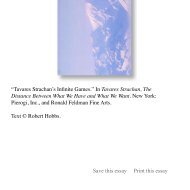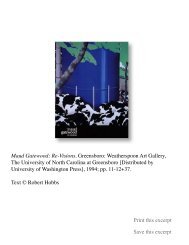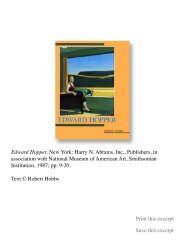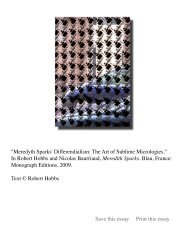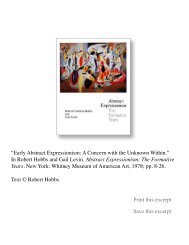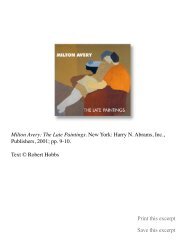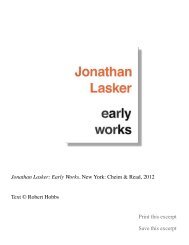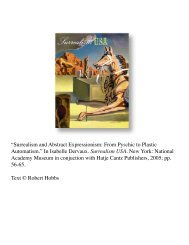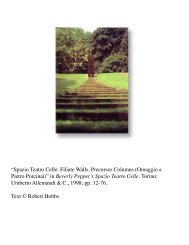Duane Hanson: The New Objectivity. Tallahassee - Robert Hobbs
Duane Hanson: The New Objectivity. Tallahassee - Robert Hobbs
Duane Hanson: The New Objectivity. Tallahassee - Robert Hobbs
You also want an ePaper? Increase the reach of your titles
YUMPU automatically turns print PDFs into web optimized ePapers that Google loves.
first implies a greater critical role for <strong>New</strong> Realism as an inversion<br />
of Minimalism and then partially withdraws the claim that this art is<br />
truly radical by pointing out that it ultimately will result in the old<br />
hegemony of a content based art. Battcock's tentative step toward an<br />
understanding of the radical nature of <strong>New</strong> Realism is significant<br />
because it indicates that the supposed death of the avant garde signified<br />
by this style may actually constitute a misunderstanding of historical<br />
events as well as a failure to comprehend the radical nature of the new<br />
illusionist art.<br />
Sometimes a severe critique of a style can provide important<br />
insights to its special character. Such is the case with Michael Fried's<br />
analysis of Minimalism, which he regards as little more than a surrogate<br />
form of realism, a type of theatrical experience inimical to High<br />
Modernist art. When Fried wrote "Art and Objecthood" which was first<br />
published in 1967 in the June issue of Ariforum and later reprinted in<br />
Battcock's Minimal Art, he was intent on pointing out the inherent<br />
contradictions in Minimalism or "literalist art," as he termed it, which<br />
threatened the High Modernist pretentions of Color Field painting. Fried<br />
championed this latter trend as a qualitative endeavor in which the<br />
essence of art is conceived as a virtual surface so that "at every moment<br />
the work itself is wholly manifest. " 6 In his effort to denigrate<br />
Minimalism as mere theater, Fried pointed out that the viewing of this<br />
art involves a period of duration during which the observer becomes<br />
part of an interactive process in which the art, a mere stage prop,<br />
becomes a surrogate being. "I am suggesting, then," Fried wrote, "that<br />
the kind of latent or hidden naturalism, indeed anthropomorphism, lies<br />
at the core of literalist theory and practice. " 7 He regards this interactive<br />
process as a theatrical effect and refers to the stage presence of the<br />
literalist objects created by the Minimalists. <strong>The</strong> space created is the<br />
actual space of everyday life and not the virtual space of the High<br />
Modernist painting he wished to uphold. He regarded Minimalist art as<br />
little more than a vanguard aberration because it did not attain the<br />
virtual, idealistic, almost sacred space of High Modernist painting and<br />
instead accorded art no more privileged a status than an inert object.<br />
While High Modernism is an elitist vanguard, Minimalism is a<br />
democratic one in its disregard of art's privileged position. Although<br />
Fried does not pursue in this essay the anthropomorphic aspect of<br />
Minimalism beyond indicating his belief that it is a regressive tendency<br />
that Minimalists have not yet expunged from their work, his critique<br />
has important ramifications for understanding the actual space of some<br />
<strong>New</strong> Realist sculpture and in particular <strong>Duane</strong> <strong>Hanson</strong>'s art which is<br />
involved with a stage presence and actual space similar to Minimalist<br />
art. <strong>The</strong> only Realist who has heretofore been associated with<br />
COLORPLATES ARE PRESENTED<br />
IN CHRONOLOGICAL SEQUENCE.<br />
<strong>Duane</strong> <strong>Hanson</strong>, Hard Hat, 1970,<br />
lifesized polyester resin and<br />
fiberglass, polychromed in oil,<br />
with accessories. Collection:<br />
Sydney and Frances Lewis,<br />
Virginia Museum ot Fine Arts.



